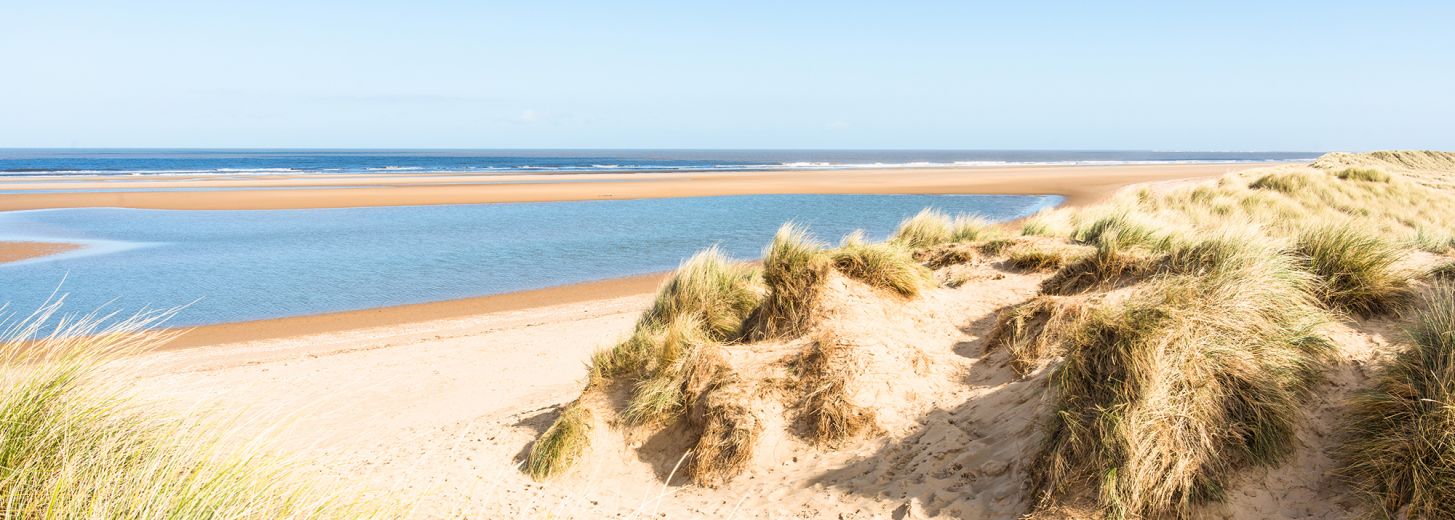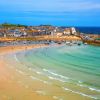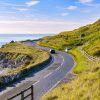There is around 12,500km of coastline in the UK, which means there’s plenty of beaches to choose from, but which are the best ones to drive to on your next road trip?
To help you plan your next adventure on the sands, here’s our guide to the UK’s best beaches, how to find them and how to drive on them!
Are you experiencing a car fault, warning, or mechanical problem on your road trip? Find a local mechanic with the RAC.
The best sandy beaches in the UK
Rhossili Bay, Gower

Often named among Europe’s best beaches, the remote Rhossili Bay has been wooing South Wales locals and holidaymakers from further afield for decades, drawn by the unspoilt nature of its wide, sweeping beach.
Although known for its breath-taking sunsets and stunning sands, the bay is also popular with walkers heading out to the dramatic Worm’s Head peninsula at low tide – named after the Viking word for dragon, Wurm.
How to get to Rhossili Bay
Located at the western tip of the Gower peninsula, Rhossili Bay is a 45-minute drive from Junction 47 of the M4 along winding country lanes that lead into the small village of Rhossili, from which you can walk down onto the sands.
Fistral Beach, Cornwall
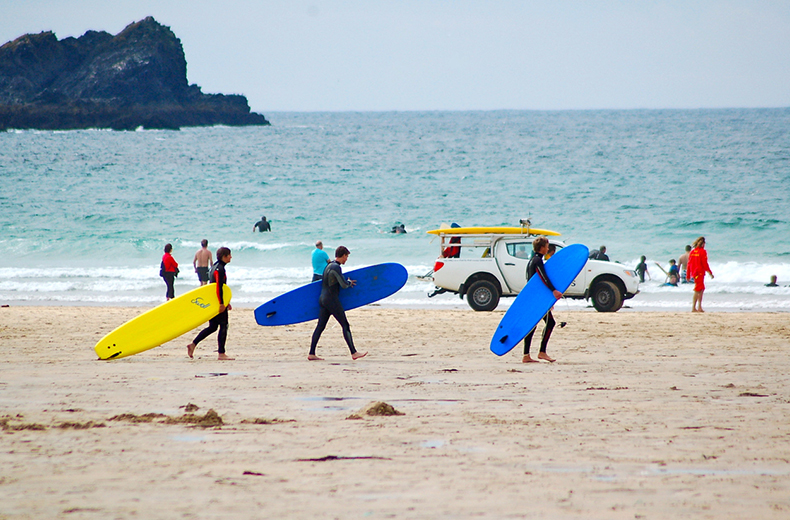
Whether you’re an avid beginner or a seasoned professional, when it comes to surfing there are few better spots in the UK to catch a wave than Fistral Beach, so strap your board onto your roof and get ready to surf!
Located just outside popular beach resort of Newquay, Fistral Beach is often quieter than nearby Towan Beach, which means it could be perfect if you’re looking for a little chillout time in between riding the surf.
How to get to Fistral Beach
Newquay is an easy 15-minute drive from the A30, the main route that runs through Cornwall, although be aware that Cornish roads can become very busy during peak season so plan your route and leave yourself plenty of time.

RAC sale – up to 33% off*
• Roadside cover from £5.29 a month†
• We get to most breakdowns in 60 mins or less
• Our patrols fix 4/5 breakdowns on the spot

Holkham Beach, Norfolk
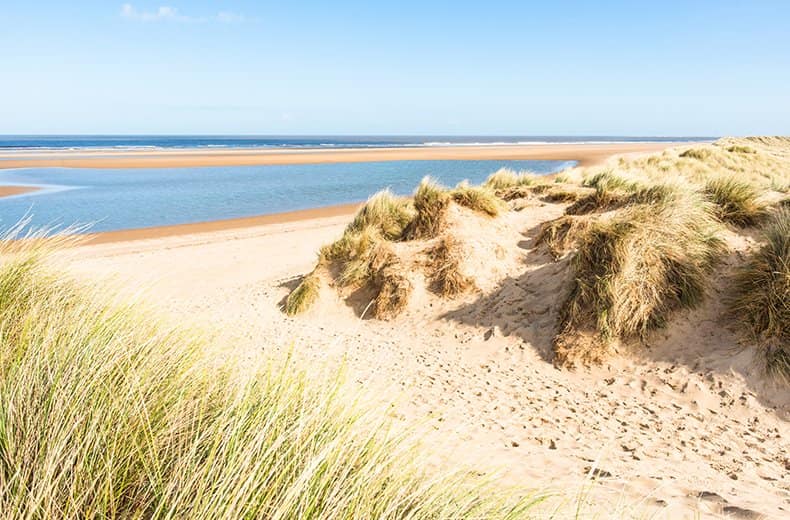
Beaches don’t come much more windswept and unspoilt than Holkham Beach, located in the Norfolk Coast Area of Outstanding Natural Beauty, which is why it was used as the setting for All Saints’ famous Pure Shores music video.
A haven for wildlife, Holkham is also popular with sunseekers looking to take advantage of the pristine sands, excellent hiking opportunities and sweeping views out across the North Sea.
How to get to Holkham Beach
Located along twisting country lanes, the remote Holkham Beach is around a 25-minute drive from the A148 and just a short drive from the nearby Holkham House, a popular stately home with extensive grounds.
Luskentyre Beach, Isle of Harris
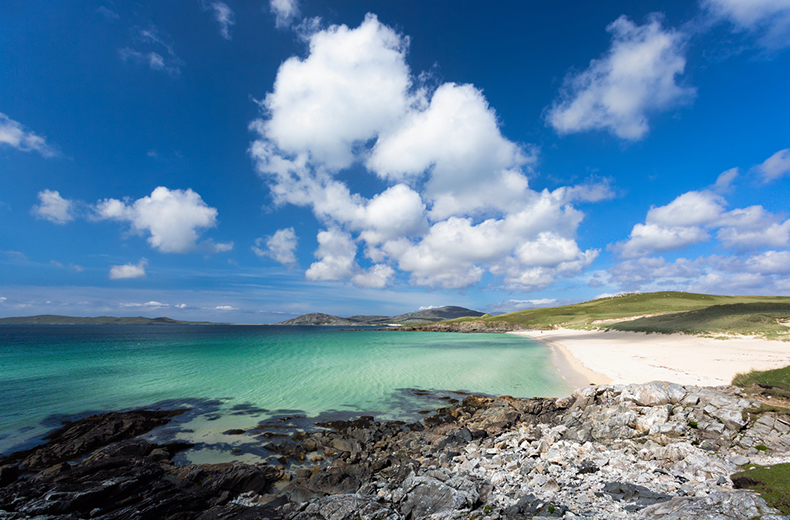
Think there are no decent beaches in Scotland? Think again. Many of the UK’s best beaches are north of Hadrian’s Wall and with turquoise waters and white sandy beaches, Luskentyre Beach feels more Caribbean than Hebridean.
Located on the eastern coast of the Isle of Harris, it doesn’t get much more remote than this, but with crystal clear Atlantic waters and an untouched, picture-perfect landscape, it’s well worth the journey.
How to get to Luskentyre Beach
If you’re after an epic beach road trip, this is it. You’ll need to drive to Uig ferry port in the north of the stunning island of Skye before taking a boat across to Talbert on the Isle of Harris, which takes around 1 hour 40 minutes.
Woolacombe Beach, Devon
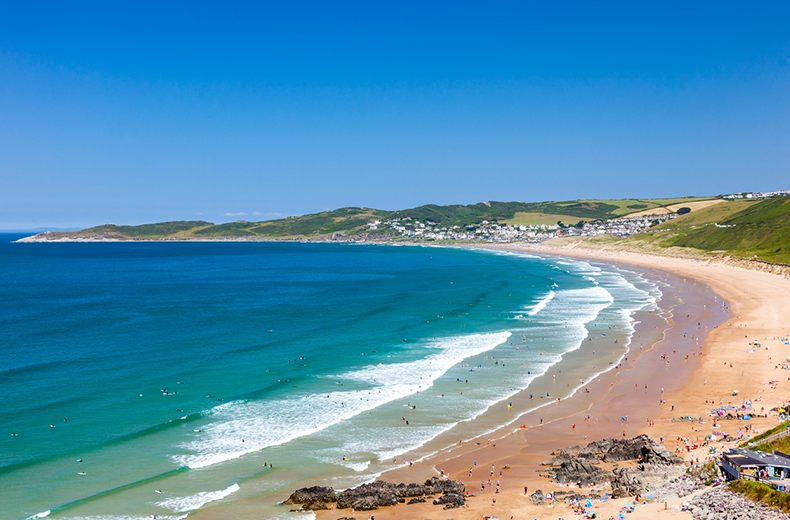
Woolacombe Beach is one of the West Country’s most popular beach spots, thanks to its golden sands and fantasic views.
The beach is very long, which means you’ll always be able to find a quiet spot, while the village of Woolacombe itself has a clutch of cafes, bars and restaurants that are perfect for watching the sun set over the sea.
How to get to Woolacombe Bay
Woolacombe is a 40-minute drive along twisting Devonshire lanes from local town Barnstaple. The village can get busy during peak season although there is plenty of parking for even the sunniest days.
Arrival Breakdown Cover
Get specialist personal based cover for caravans, motorhomes and campervans from just £11 per month^.


Top 10 sandy beaches to visit in 2025
Porthcurno Beach, Cornwall
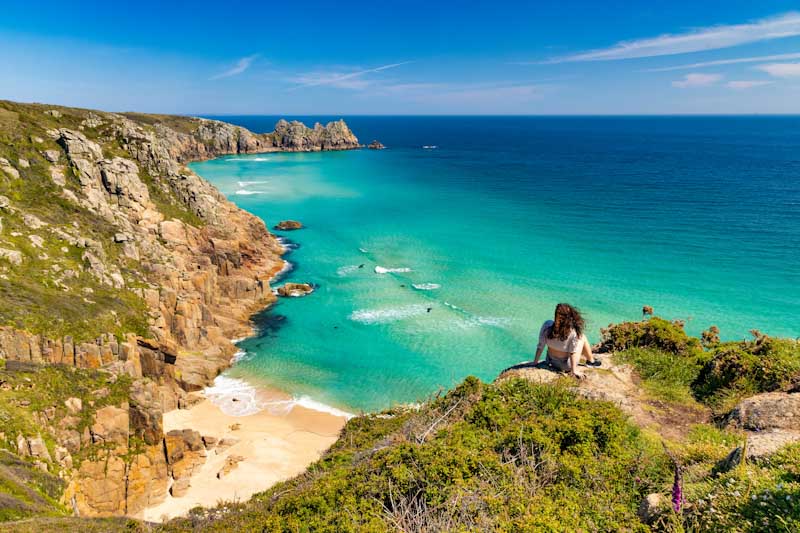
Located in a stunning cove in Cornwall, the white sands, and turquoise waters of Porthcurno Beach are perfect for relaxing or water sports. Surrounded by dramatic cliffs, it is also popular with hikers. To get there, drivers will need to drive down the A30 to Penzance – and follow signs for St Buryan and Porthcurno.
Camber Sands, East Sussex
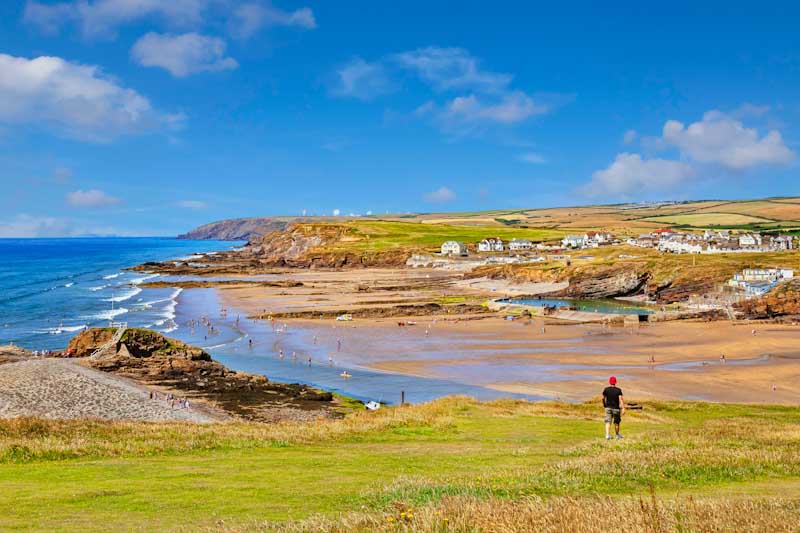
An iconic beach near Rye, Camber Sands is known for its vast golden dunes and long beach, which is popular with families in the region. As one of the few sandy beaches in the south east of England, it is also a magnet for water sports enthusiasts. Drives will need to head to the A259 and look for signs to Camber Village.
Bamburgh Beach, Northumberland
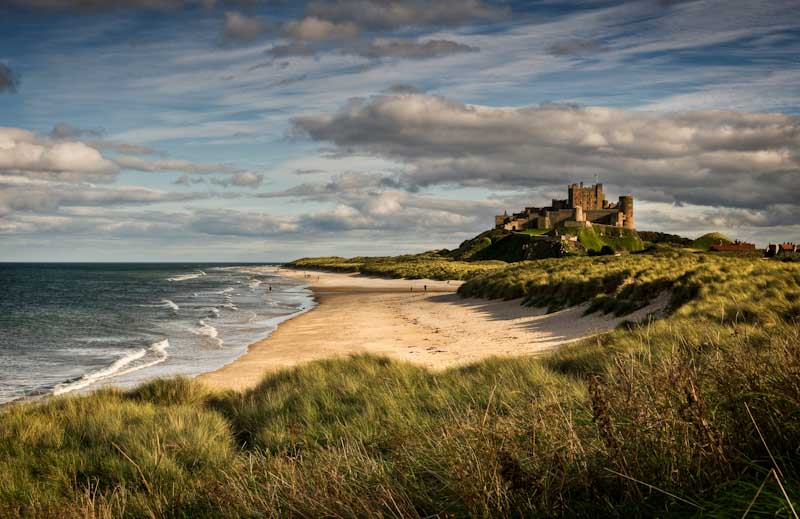
Overlooked by the historic Bamburgh Castle, this sandy stretch is a scenic beach that has been used in many movies and television shows over the years. It is known for great walks and its rugged coastline. The A1 road takes drivers to the village of Bamburgh, and then it is a short walk to the beach.
Freshwater West, Pembrokeshire
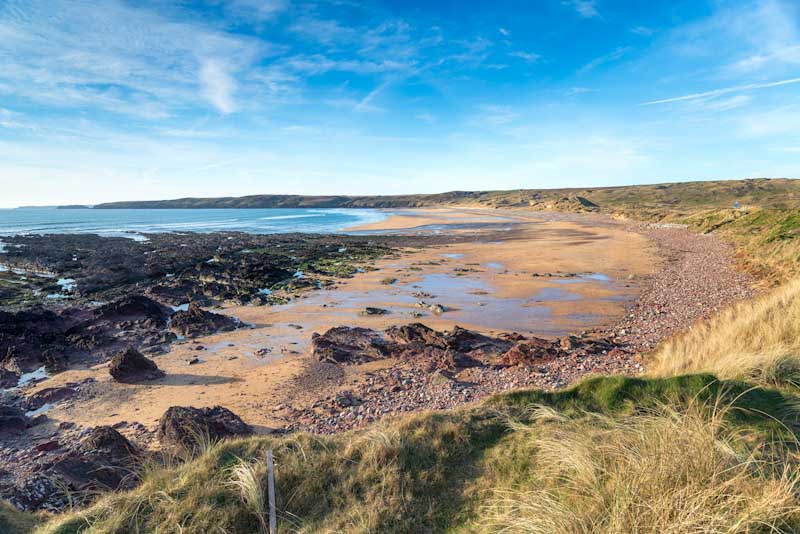
One of Wales’s most popular tourist attractions, this wild and windswept beach is known for its powerful waves and dramatic scenery – that has also been used in many movies over the decades. Popular with surfers, it is more remote than many of the other beaches on this list. Drivers will need to use the B4319 to Pembroke to reach this beach, followed by smaller local roads to the final destination.
Durdle Door Beach, West Lulworth
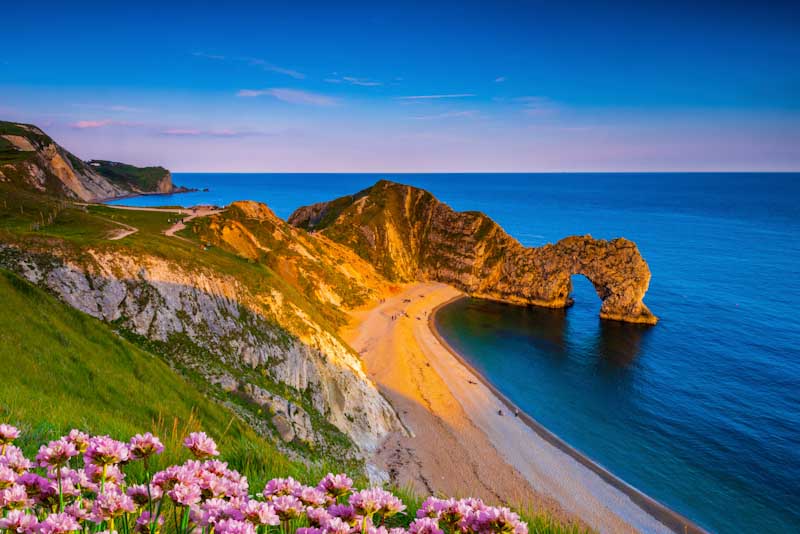
Part of the Jurassic Coast, the famous limestone arch is one of the UK’s most famous landmarks. The steep cliffs and sandy beach are very popular in the summer. The village of West Lulworth is the closest location to the beach, which is located along the A352.
Bournemouth Beach, Bournemouth
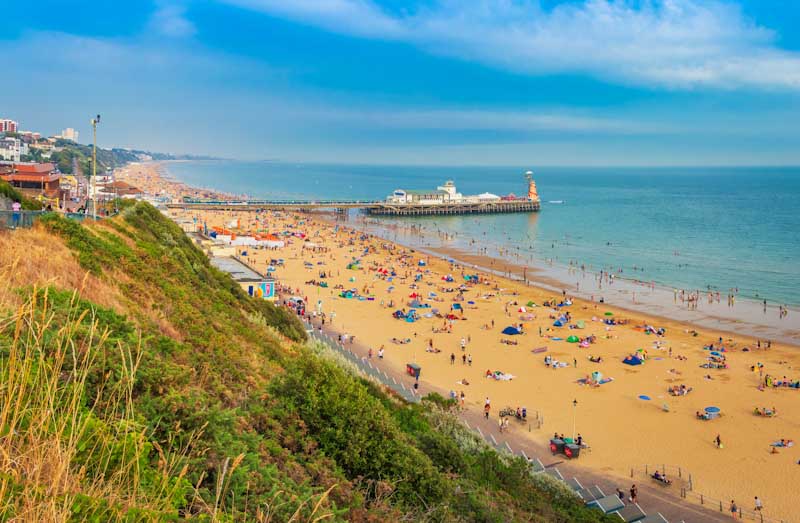
Seven miles of golden sands, this beach on England’s south coast has a famous pier and plenty of classic British seaside attractions. Popular with all types of tourists, from families looking for a day out, to adrenaline junkies looking for a perfect water sports location, this is one of the regions most busy areas in the summer months. Head to the A338 in the town and there is an abundance of parking spaces.
Watergate Bay, Newquay
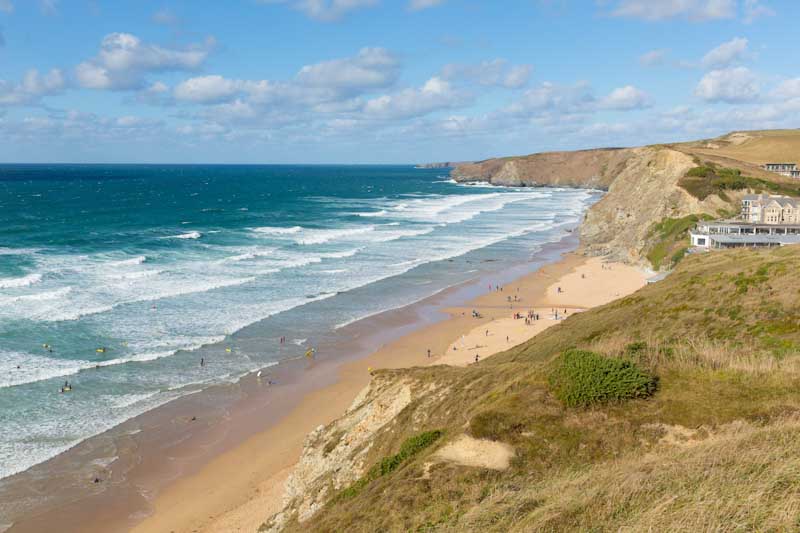
A magnet for surfers and beachgoers in the region, this Cornish tourist hotspot is perfect for families and those looking for a weekend getaway. Head towards the A3059 towards Newquay and follow signs for the beach. There are many holiday parks and camping areas available.
Summerleaze, Bude
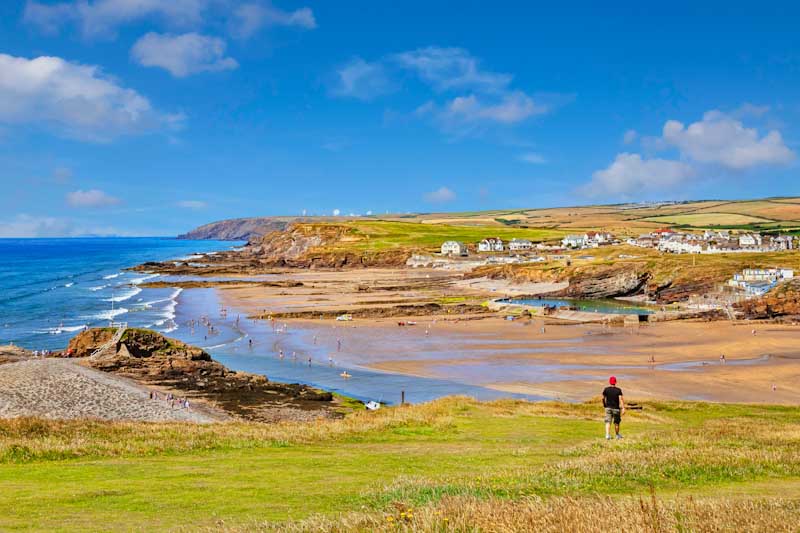
Known for its long row of colourful beach huts, Summerleaze is a large white sandy beach with a sea pool for safe swimming. Perfect for swimming and a day out with the family, it can be reached by heading down the A39 towards Bude.
St Ives Bay, St Ives
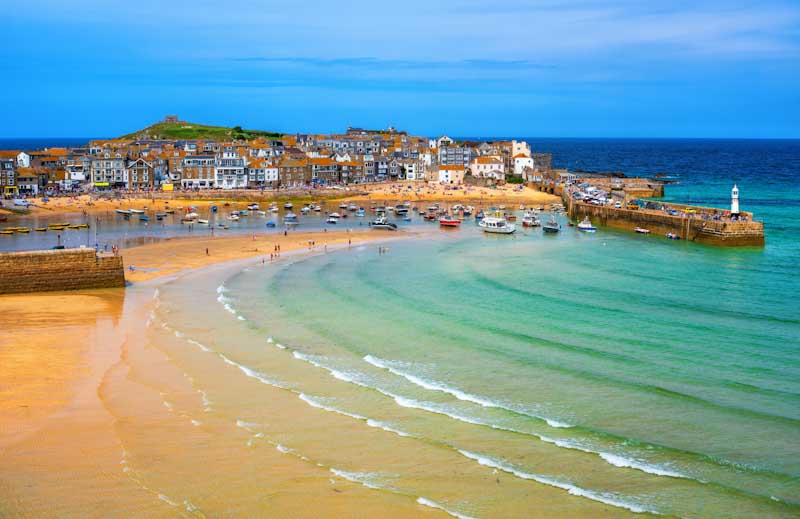
Stretching from Godrevy to Hayle, this beach is one of the most photographed in the whole of the UK. This three-mile-long beach is perfect for hikes, water sports, or relaxing with the family. A short trip to the iconic town of St Ives, it blends natural beauty with a charming seaside town.
Kynance Cove, Cornwall
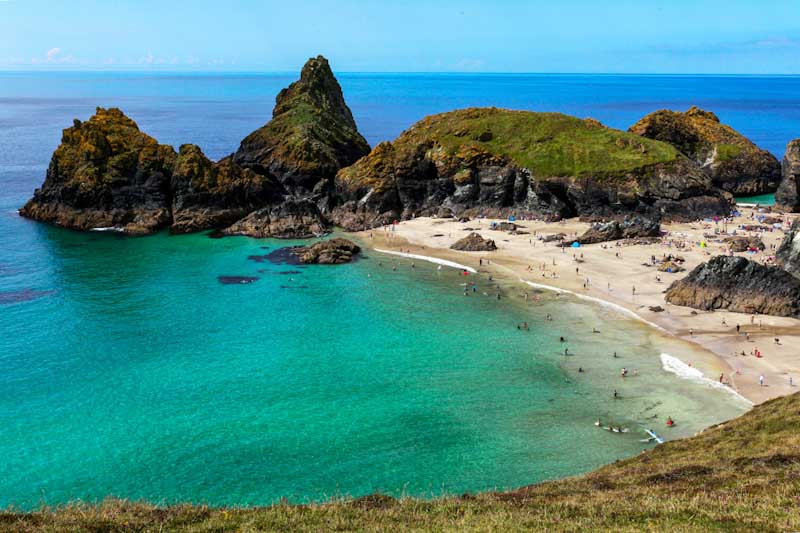
Located on the Lizard Peninsula, this Cornish beach has dramatic cliffs and rock formations – as well as turquoise water and white sands. Despite being one of the more remote beaches in the area, it is a hotbed for tourists in the summer months. To get there, drivers will need to head to the town of Lizard along the A3083 and then follow signs for Kynance Cove.

RAC sale – up to 33% off*
• Roadside cover from £5.29 a month†
• We get to most breakdowns in 60 mins or less
• Our patrols fix 4/5 breakdowns on the spot

Can you drive on the beach in the UK?
The majority of beaches don't allow vehicle access but there are a handful around the UK that will allow you to drive on them.
Popular ‘driving’ beaches include Black Rock Sands in North Wales, Benone Strand in Northern Ireland and Brean Beach in England, although check before you go to ensure there are no restrictions on driving on the sand in place.
How to drive on sand
The most important thing to remember before driving on any beach is the local conditions, including tides, channels and any quicksand, to ensure you avoid becoming trapped and putting yourself and other passengers in serious danger.
4WD / AWD on sand
Four-wheel-drive vehicles are better suited to driving on sand due to their higher clearance. Cars with lower clearance will drag their body over the sand and that could cause damage or mean you get stuck.
When it comes to driving, travel at slower speeds in a lower gear while keeping your revs up to help you maintain forward momentum. Drive smoothly and let the sand steer your car (within reason) to avoid getting stuck.
Tyre pressure for sand driving
To help, you can also lower the pressure in your tyres to give them more surface area which can aid traction on the sand. For more information on tyre pressure, check out our tyre pressure guide here.
When you park up, make sure you’re facing downhill as you may need the momentum and if you’re following another car, make sure you don’t follow too closely in case you both end up getting stuck.
What do I need to watch out for when driving on the beach?
While the beaches you can legally drive on may not be the UK’s busiest beaches, they are still popular with families, dogwalkers and other beach users – so always be aware of your surroundings and keep your speed down.
It goes without saying, but driving on sand is very different to driving on roads and you may find your car doesn’t handle anything like you’re used to, so be aware this could impact on your steering and braking. Adjust your driving style accordingly.
- Top UK dog-friendly beaches
- Road trips in Wales - six of the best Welsh drives
- Temporary car insurance - from one hour to 30 days
Will the RAC cover me if I drive on sand?
At the RAC, we offer all our members breakdown assistance should they get stuck while driving on a sandy beach within the UK.
However, you should protect yourself from any dangers associated with driving on the beach by taking all necessary precautions to avoid putting yourself and others at risk.
What do I need to remember before I start my beach road trip?
Before heading off on any road trip to the beach, it’s always important to carry out some essential maintenance checks at home to ensure your car is in tip-top condition and you’ll get to your destination and back safely.
The RAC encourages drivers to remember the acronym ‘FORCES’ when carrying out car checks: Fuel, Oil, Rubber, Coolant, Electrics, and Screenwash. Check our tips for avoiding a breakdown for more information on FORCES.
You should also remember to take along a few road trip essentials for the journey; including a first aid kit, additional engine oil and water, mobile phone charger and snacks and games, especially if you’re travelling with children.
Get a service or repair at home
RAC Mobile Mechanics can come to you, saving you the hassle of going to a garage.



